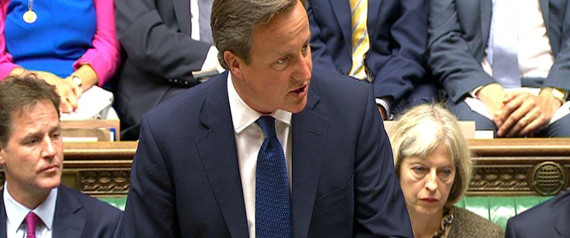David Cameron has been warned that his plan to prevent British citizens who are accused of fighting with terror groups abroad from returning home offends the "basic principles" of British law.
On Monday, the prime minister announced that police will be given temporary powers to seize passports from people at the British border.
Cameron also said the government would "work up plans" for discretionary powers to exclude British nationals from the UK. He told MPs it was "abhorrent" that British citizens who pledge allegiance elsewhere were able to return to the UK and pose a threat to national security.
Cameron said: "Adhering to British values is not an option or a choice. It is a duty for all those who live in these islands so we will stand up for our values, we will in the end defeat this extremism and we will secure our way of life for generations to come."
The prime minister also announced that new powers will be introduced to bolster terrorism prevention and investigation measures (Tpims), including "stronger locational constraints".
But Dominic Grieve, who served as Attorney General until Cameron fired him from the cabinet in July, said the plan to block people from returning home was a mistake.
"I do share concerns that have been expressed that the suggestion British nationals, however horribly they may be alleged to have behaved, should be prevented from returning to this country. Not only does it offend principles of international law, it would actually offend basic principles of our own common law as well," he said.
Grieve said the "best course" of action would be to put any suspects on trial and "bring these individuals to justice".
Cameron said his first approach was to try and prosecute people in the UK, but added that he wanted to plug any "gaps" in the police's armoury.
Ed Miliband also said Mr Cameron's proposals to exclude British nationals involved in terrorism abroad from entering the country were "unclear".
The plans to extend anti-terrorism powers come after a weekend of Coalition negotiations following an increase in the terrorist threat to the UK from substantial to severe.
Original Article
Source: huffingtonpost.co.uk/
Author: The Huffington Post UK
On Monday, the prime minister announced that police will be given temporary powers to seize passports from people at the British border.
Cameron also said the government would "work up plans" for discretionary powers to exclude British nationals from the UK. He told MPs it was "abhorrent" that British citizens who pledge allegiance elsewhere were able to return to the UK and pose a threat to national security.
Cameron said: "Adhering to British values is not an option or a choice. It is a duty for all those who live in these islands so we will stand up for our values, we will in the end defeat this extremism and we will secure our way of life for generations to come."
The prime minister also announced that new powers will be introduced to bolster terrorism prevention and investigation measures (Tpims), including "stronger locational constraints".
But Dominic Grieve, who served as Attorney General until Cameron fired him from the cabinet in July, said the plan to block people from returning home was a mistake.
"I do share concerns that have been expressed that the suggestion British nationals, however horribly they may be alleged to have behaved, should be prevented from returning to this country. Not only does it offend principles of international law, it would actually offend basic principles of our own common law as well," he said.
Grieve said the "best course" of action would be to put any suspects on trial and "bring these individuals to justice".
Cameron said his first approach was to try and prosecute people in the UK, but added that he wanted to plug any "gaps" in the police's armoury.
Ed Miliband also said Mr Cameron's proposals to exclude British nationals involved in terrorism abroad from entering the country were "unclear".
The plans to extend anti-terrorism powers come after a weekend of Coalition negotiations following an increase in the terrorist threat to the UK from substantial to severe.
Original Article
Source: huffingtonpost.co.uk/
Author: The Huffington Post UK

No comments:
Post a Comment